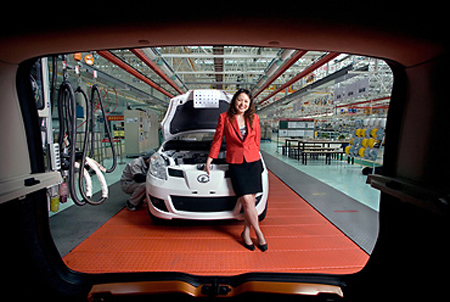Great Wall Motor: Gunning for Glory
Already China's top maker of SUVs and pickups, Great Wall has ambitious plans for the small-car market
When it comes to China's auto powerhouses, Great Wall Motor may not immediately come to mind. It's still small compared with the country's other homegrown auto brands, with only a 1.2% share of the car market. Based in Baoding, Hebei, a rural area two hours from Beijing, Great Wall was a village-run operation focused on farm machinery until it went private 18 years ago. These days, it's known mostly for its best-selling sport-utility vehicles and pickups.
But Great Wall has big ambitions in cars. It launched its first-ever small car, the 1.3-liter GW Peri (selling for $6,400 to $7,800) earlier this year. It has invested $11 million in a new safety lab aimed at boosting the quality and reliability of its autos. Now the company plans to roll out 15 more models—including sedans, pickups, and SUVs—over the next two years.
That ambition may have just gotten a boost, too. On July 3, Chrysler announced that it had signed a memorandum of understanding with Great Wall, with the two companies looking into long-term business cooperation in distribution, components, and technology. While Chrysler would like greater access to the China market, the Chinese auto player hopes to tap Chrysler's technology and international distribution expertise. Hong Kong-listed Great Wall saw its stock rise by some 2% following the announcement. (Like all Chinese auto stocks, Great Wall shares have fallen by more than 50% over the past 12 months, pulled down by soaring fuel prices.)
Great Wall Has a Female CEO
What's most unusual for China's auto industry (and indeed the world's carmakers) is that the chief executive officer behind this expansion is a woman, and a relatively young one at that: 37-year-old Baoding native Wang Fengying. Wang, who became CEO in 2002, has one of the longest tenures among Great Wall executives. She joined the company just after it became a private enterprise. Even though Great Wall was small and had an uncertain future, Wang saw opportunity. "If one is industrious working in a private company, you have a good chance to develop. And if you don't have a strong background [with connections to get ahead], then you certainly have to rely on your own industriousness," she says. "Also, the auto industry was then a new industry in China; that meant there was more room to develop."

CEO Wang Fengying in Great Wall Motor's newest factory
Under the leadership of Wang, who served as top marketing manager before becoming CEO, Great Wall has certainly developed. As the first to exploit the relatively untapped pickup market, the company was able to grow rapidly. Over the past decade it has held the top market spot in China with its best-selling Deer series of trucks, which retail for $10,000 to $10,300. Then, in 2002, Great Wall launched its first sport-utility vehicle, the SAFE. Its low price—under $11,600—quickly made it a top seller on the mainland.
That was followed by two more SUVs—the Sing and, most recently, the 2.4-liter (2.8-liter in the diesel version) Hover, currently the most popular model in its class. It holds that spot even though it's several thousand dollars pricier, depending on the model, than China's No. 2 SUV, Chery's Tiggo (BusinessWeek.com, 1/4/08). Honda's (HMC) higher-priced CR-V and Hyundai's Tucson both trail, with smaller market shares. Driven mainly by sales of the Hover, Great Wall's domestic SUV sales last year rose 61.6%, to 64,732 units, faster than the overall SUV market, which was up 57.8%.
Eyeing the Sedan Market
Great Wall's performance has been equally impressive when it comes to exports, with 51,394 vehicles sold overseas last year. The Hover, as well as the company's other SUVs and pickups, now sell in scores of countries across the former Soviet Union, in Southeast Asia, Africa, and even Italy. Great Wall also maintains an impressive network of assembly factories overseas, in Russia, Ukraine, Iran, Vietnam, Brazil, Egypt, Romania, and Nigeria. All told, the carmaker pulled in $1.1 billion in revenues in 2007, up 54% over the previous year, with a net profit of more than $130 million, 33% higher than in 2006.
Emboldened by such successes, Great Wall has now entered the car market with the GW Peri, which competes directly with the similarly priced Chery QQ. And that's hardly the extent of the company's ambition. Of the 15 models it has planned for release by 2010, 10 will be sedans, with most of those being mini, small, and compact-sized cars with engine sizes ranging from 1.3 liters to 1.5 liters, says Wang. "We would like to occupy the leading position in China's small sedan market by 2009 or 2010 at the latest," she says. "Building the Great Wall brand is a dream that I have long been pursuing. I want to make it into both an international brand and a great brand in China."
Roberts is BusinessWeek's Asia News Editor and China bureau chief.
Gasgoo not only offers timely news and profound insight about China auto industry, but also help with business connection and expansion for suppliers and purchasers via multiple channels and methods. Buyer service:buyer-support@gasgoo.comSeller Service:seller-support@gasgoo.com







